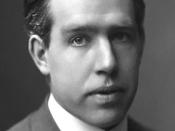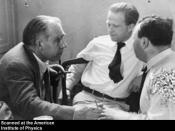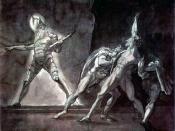One of the greatest gifts a person can be given in life is a loyal confidant. A person who is trustworthy, faithful and to whom secrets can be confided is a rare treasure. In the play Hamlet, Hamlet was able to trust his good friend Horatio with his innermost secrets. Comparatively, in the play Copenhagen by Michael Frayn, the character Margrethe Bohr acted as a confidant to not only her husband Niels Bohr, but to Werner Heisenberg as well. Although Margrethe and Horatio both acted as confidants, they served very different purposes in the plays.
In Hamlet, Horatio acts as a traditional, loyal confidant. He is honest and faithful and would do anything for his friend Hamlet. Hamlet shares with Horatio all of his thoughts and experiences in the situation involving his father. In doing so, it gives the audience a better idea of what Hamlet is thinking and feeling.
Another purpose of Horatio as a confidant is so he will be able to tell Hamlet's story after he is dead. Hamlet entrusts Horatio with the responsibility to "Report me and my cause aright to the unsatisfied"ÃÂ (5.2.333). Hamlet knows that Horatio has the insight and compassion to be fair when repeating his story. Horatio was the one person in the play that Hamlet could trust and confide in. The character of Horatio was essential in Hamlet.
Although Margrethe was a confidant in Copenhagen, her character was not as essential to the plot of the play as Horatio's was. It can be questioned why Frayn chose Margrethe to appear in the play as a confidant. Why did Frayn not depict instead Carl von Weizsacker, who accompanied Heisenberg to Copenhagen and whose pronouncements on physics would have been more authoritive than those of Margrethe? Probably because the idea is to recreate what happened when Heisenberg went to talk with Bohr at his house, not in his physics institute. Margrethe is present simply to make the play more personal. Another function of Margrethe as a confidant is to help the audience understand the scientists better. In reference to their talk of mathematics and physics, Bohr states, "We're going to make the whole thing clear to Margrethe"ÃÂ (38). He is not only making everything clear for Margrethe, but for the audience as well. Confiding to Margrethe "in plain language"ÃÂ (38), helps the audience better understand their talk of physics. Margrethe asks questions about their work that the audience can relate to. She functions as an average person as opposed to a scientist.
Although Horatio and Margrethe serve different purposes, they share many similarities as well. Both characters help the audience understand the play better. Horatio reveals many of Hamlets thoughts throughout the play, while Margrethe helps the audience understand the scientist's ideas in simple terms. Both Horatio and Margrethe, although not main characters, possess the knowledge in the end to tell the personal stories of their loved ones. They are both loyal, honest characters who serve as wonderful confidants.
Horatio and Margrethe illustrate just how valuable a confidant can be. Without them, Hamlet and Bohr would not have had anyone to share their secrets with, and to tell their stories when they passed away. Through Hamlet and Bohr confiding in them, not only did Horatio and Margrethe understand their loved ones better, but the audience did as well. The plays Hamlet and Copenhagen would not have been as effective without Horatio and Margrethe. Their roles as confidents stretched far beyond that of simply being confided in.





